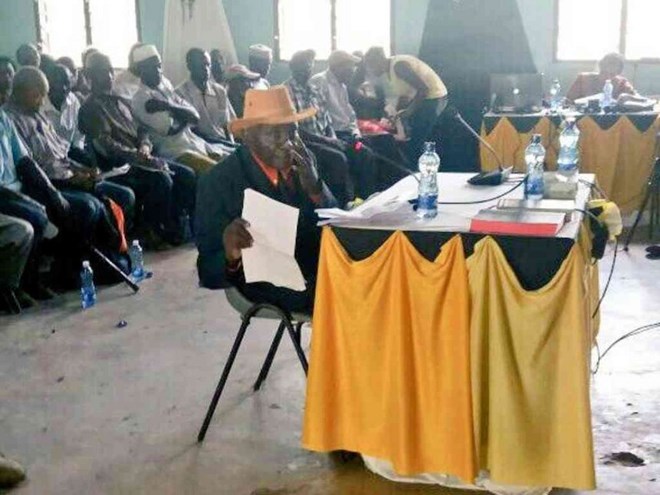
Thursday, November 10, 2016
By OLIVER MATHENGE

Peter Ngugi, a resident of Mpeketoni in Lamu county, makes his presentation to the Kenya National Commission on Human Rights during a public inquiry on November 10, 2016. /COURTESY
Questions of where police were while al Shabaab militants massacred more than 60 people during Mpeketoni attacks in June 2014 featured during a public inquiry on Thursday.
Residents accused the government of failing to act on their plight following the attacks that took place in Lamu county between June 15 and 17.
They also told the Kenya National Commission on Human Rights public inquiry that they were yet to be compensated.
Peter Ngugi, who was the first witness on Thursday, narrated how he lost his son to unknown gunmen in an attack which left more than 60 people dead.
Ngugi said questions regarding the death of his son were a pointer to the deep emotional and psychological wounds and trauma residents suffer.
"As residents of violations seek compensation, it is important to embrace forgiveness and seek reconciliation mechanisms," he told the panel which included the Independent Policing Oversight Authority.
Read: Cops 'defied orders' to repulse al Shabaab during Mpeketoni attacks
Also read: 'Jesus' denies funding Mpeketoni attacks
Ngugi also said there was need to set up rehabilitation centres in Mpeketoni to help young people overcome drug abuse.
He added that land ownership was one of the reasons for insecurity as natives and herders from pastoralist communities clash often.
The second witness identified only as J Wainaina said the big question was where police were when Mpeketoni residents were being attacked.
"Our businesses were burnt yet nothing has been done. Many were left widows and many children as orphans," said Wainaina.
"The attackers hid behind Islam to perpetuate violence and create enmity."
Wainana further said some of the widows have been evicted from family land by greedy buyers.
He also said herders destroy crops and use crude weapons to harm and even kill farmers.
Wainaina said security personnel including those from the Kenya Wildlife Service were doing little to help.
"The national and county governments must come together and solve the conflict between herders and locals," he said.
The commission with finish its two-day sitting with inquiries in Mpeketoni on Friday. It is in the second phase of an exercise aimed at analysing the impact of insecurity in Lamu, especially during and after the Mpeketoni attacks.
The first phase of the public inquiry by the rights body was carried out between May and June and was aimed at establishing the nature and causes of perennial insecurity in the North Rift.
During a session on Tuesday, a Kenya government nurse has claimed police tortured him for 16 days on suspicion that he treated al Shabaab militants in Mbwajumwali, Lamu East subcounty.
The nurse, who is now based at King Fahd on Lamu island, said 12 police officers stormed into his house claiming he treated the militants at Mbwajumwali dispensary.
He said he was held 16 days, three of them incommunicado, at an unknown place while blind-folded.